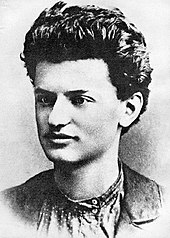Leon Bronstein came of age in the year 1897, which was also the year when he advanced from ordinary schooling in Brooklyn and moved on to study mathematics in New York University, at least initially. Although his family certainly wasn't the poorest it could have possibly boon, it wasn't wealthy enough to pay for expensive studies either, especially not for a field they did not see as all that promising. Disregarding his family's opinion, Leon continued, earning the dough in a manner of ways - working as a private English language tutor for fellow Jewish immigrant kids, as well as working part-time in an industrial sawmill. Although both of these jobs were important to shaping Bronstein into the person that he later became, the latter ended up more important, as through the acquaintances and connections he acquired during his work as an industrial laborer, he was introduced to American socialist ideology.
The late 19th century saw a slow, but steady rise of the socialist movement in the United States, similar to the rest of the world at the time. Starting in the 1860s and 1870s, labor movements, trade unions and small, fractured, but rising socialist political movements would crop up across the American scene, their rise marked by strikes, clashes with the police, bombings and suppression. It was around this time that the first outspoken socialist politicians were being elected to public office, like Mayors or Representatives. The ideals of equality, internationalism and progressive legislation which this movement exhibited well resonated with the young Bronstein, filling up the primary slot in his developing political spectrum. After barely passive the final exams and acquiring a bachelor's degree in mathematics (not out of lack of trying of course - more like attempting to hold three jobs at once), Bronstein declared it a job well done and moved on to begin work with New York's labor organizations and trade unions. At a relatively young age, in 1901, Bronstein became a journalist working for
The Jewish Daily Forward, a young Yiddish-language daily left-leaning newspaper in New York, working here for the following decade. His Yiddish skills might not have been the greatest, but his colleagues and even the editor, Abraham Cathan, noted his dedication and writing skills. Alongside that, he sometimes submitted publications to the
International Socialist Review (at least before it took a turn to hardline Marxism) and the
Appeal to Reason, he participated in trade union activities in New York, helping organize meetings and strikes, and even attended as an observer in a few meetings of the Industrial Workers of the World, although did not condone the radicalism of some of the organization's leaders.
It should be noted that while Bronstein was firmly in the left-wing of American politics, his ideology was far from being as radical as some of his compatriots. For example, although affiliated with the Socialist Party of America for the first years of his political career, Bronstein was more of a proponent of slower, democratic reforms to the capitalist system, fearing that an outright revolution could not only end up in a collapse of the system, but also result in a tyranny rising from the shadows. In that regard, Bronstein could definitely be described as a democratic socialist, although calling him a social democrat wouldn't offend everyone, either. Perhaps this is the reason why, both according to him and to various secondary sources, one of his first true political admirations was Theodore Roosevelt, President of the United States from 1901 to 1909. As one of the first heads of state in American history to pay attention to the growing class struggle in the United States and stand for progressive reforms in the form of his Square Deal, Roosevelt caught Bronstein's attention as a potential example of progressive social reforms being possible and achievable in the American political landscape. The President's internationalist stance and successful work in resolving wars and disputes across the globe played into the journalist's innate internationalism, too.
Bronstein enthusiastically voted for Roosevelt in the election of 1904 (thus catching the ire of some of his more radical socialist colleagues, who believed that the Square Deal was too little too late), as well as for his designated successor William Howard Taft in 1908 - although he later regretted the latter vote, much like Roosevelt himself. The Taft administration coincided with Bronstein solidifying his share of influence over the politics of New York - the charismatic, assertive, though also considerably arrogant journalist had become an enduring sight among New York's labor unions and the media, serving as an important anchor for the influence of labor unions over the town and the state, so much so that the political establishment had to recognize that this newcomer could end up going far if left unchecked. Especially with a new, and very contentious election coming up.



